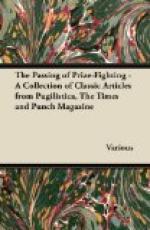Those willing to pay high prices would have arranged for them such displays as “normal artillery activity,” pukka strafes, S.O.S. bombardments or barrages chaperoning infantry advances, while balloons might be set on fire, dumps blown up, or leave cancelled at special rates. There might also be an assortment of inexpensive and amusing side-shows, such as a Second-in-command trying to check a monthly return of dripping, or a conscientious gunner calculating the correct corrector corrections.
Should an application be received from any person anxious to experience war from the “Receipts” end he would be granted free entry to the area on the far side of the line, protected grand-stands being erected, from which, on suitable payment, spectators could study his deportment. A short stay in the “enemy’s area” during a strafe might be recommended for politicians and arranged by their constituents.
Space forbids further detail. It remains only for a Company to be formed—affiliated perhaps to the Bureau of Information—a detailed prospectus issued and applications invited for posts under the Army of Entertainment, Ltd.
I shall myself be willing to serve the Company in the capacity of a Town Major on condition that a suitable town is provided.
* * * * *
[Illustration: FOREWARNED.
Poor Old Woman (to youth, who has given her a gratuity and relieved her of her load of wood). “I PRESUME, MY KIND YOUNG FRIEND, THAT YOU ARE THE YOUNGEST OF THE THREE BROTHERS WHO ARE GOING OUT TO SEEK THEIR FORTUNES?”
Clever Youth. “NO, I’M THE ELDEST. BUT I’VE BEEN READING THE STORIES.”]
* * * * *
WISE WORDS FOR BIRDS.
Dear Mr. Punch,—While lately turning over some old family papers I came across a number of maxims in rhyme which seem to me to be worthy of publication at a time devoted to good cheer. The form appears to be the same as that expressed in the familiar couplets on the woodcock and the partridge; but these variations on an old theme have at least the merit of freshness and originality.
I begin in order of magnitude with the ostrich:—
“If an ostrich had but a woodcock’s
thigh
It would only be some three feet high.
If a woodcock had but an ostrich’s
jaw
It would have to be carved with a circular
saw.”
The foregoing lines clearly enforce the important lesson of contentment with the existing order. This moral is perhaps less implicit in the lines on the peacock:—
“If a peacock had but the nightingale’s
trill
It would make all prima donnas feel ill.
If the nightingale had but the peacock’s
tail
It would merit a headline in the Mail.”
Contentment again is the keynote of the couplets on the owl:—
“If an owl would enter the nuthatch’s
nest
Its figure would have to be much compressed.
If the nuthatch had but the face of an
owl
It would be a most unpopular fowl.”




